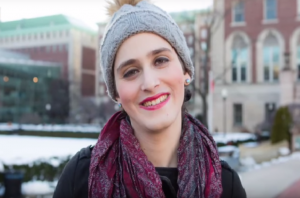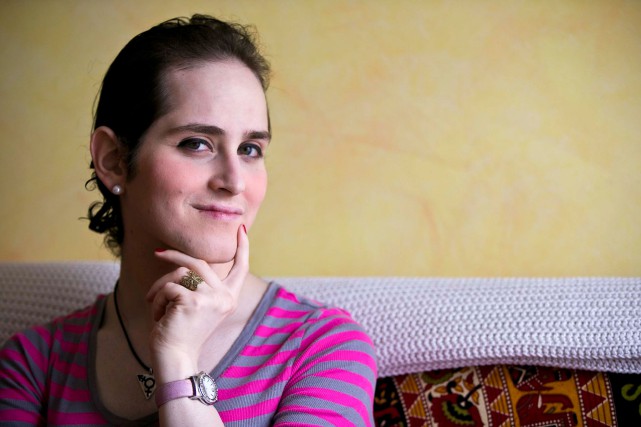At the age of 26, Abby Stein says she’s finally living as her authentic self.
“Even two years since the first time I walked out as a woman, it feels amazing to be perceived as who you are and not afraid of people mis-gendering you,” says Stein, who came out as a transgender woman in 2015, just three years after leaving the Chasidic community where she grew up.
“In the Chasidic community worldwide, I am the first person to come out as transgender — and I am refusing to shut up about it,” says Stein, an activist, blogger and public speaker for the transgender community who has made international headlines. “I can see when people hear personal stories, they seem more open-minded and accepting. It’s easy to hate an idea; it’s harder to hate a person in front of you telling you their story.”
On Tuesday night, Feb. 20, Stein will speak about her life story at Goucher College in Towson. The free event — sponsored by the Goucher Hillel, the Center for Race, Equity and Identity, Title IX and the Office of Religious and Spiritual Life — will start at 7, is open to the community and will take place at the Hyman Forum of the Athenaeum on Goucher’s campus.
(In addition, Stein will speak at The Soul Center at Pikesville’s Beth El Congregation, 8101 Park Heights Ave., on Thursday, March 22, at 7 p.m.)
“I am not just looking forward to Abby’s story as a transgender individual, but as someone who was in a place where she didn’t belong and wanted to find a place where she could belong,” says Rachel Plotkin, assistant director at the Goucher Hillel. “I think finding a place to belong is a story many people can relate to.”
Never Truly A Boy
For Stein –- who received rabbinic ordination in 2010 — getting to where she is today has been a complicated yet rewarding journey.
She was born into the Chasidic community in the Williamsburg section of Brooklyn, N.Y., and grew up a boy among a very gender-segregated group.
One of 13 children, Stein spoke only Yiddish and Hebrew, had no access to the internet or television, and could not read any magazines or newspapers from outside the Chasidic world. Even though she looked like a boy, Stein says she was never truly a boy.
“When I was 4, I have a vague memory of mentioning something to my mother along the lines of not feeling like a boy, and the message I got back was that I could never speak about that and that it wasn’t possible,” Stein, a direct descent of the Baal Shem Tov, the founder of Chasidism, told Jmore. “When I was 7, I remember collecting newspaper clippings about organ transplants because I was going to collect enough articles to do a full body transplant to a woman. And at age 9, I would pray every night that I would wake up as a girl.”

Because she was told she couldn’t question her gender, Stein says she began questioning religion in general and whether she believed in the brand of Judaism she was being raised.
While she describes herself today as an atheist, Stein continued to live in the Chasidic community, having an arranged marriage at the age of 18 and a son at 19. Becoming a parent became a turning point in her story.
“When I was expecting my son, gender began punching me in the face and it became harder to deal with,” Stein says. “We ‘gender’ babies before they are conceived and I remember thinking, ‘What if my son is like me?’”
At 20, Stein says she did what she calls “one of the worst things you can do in the Chasidism” — she went online and Googled “if a boy could turn into a girl.”
Because she was not fluent in English, she visited the Wikipedia’s Hebrew page where she was introduced to a support group for transgender people. It was then that she told her now ex-wife about her religious questioning and started the process of leaving the Chasidic community.
In 2013, Stein got divorced and “came out as not Orthodox,” but was still living as a man.
“Most people think I left the Chasidic community because I am transgender, but I left because of religious and ideological reasons,” says Stein. “Being transgender triggered those questions, but ultimately I felt I didn’t belief in the ideology.”
Only One Regret
With the help of Footsteps, a New York-based organization that provides support to individuals leaving the Chasidic and ultra-Orthodox communities, Stein learned English, earned her high school diploma and was accepted into Columbia University.
But even then, she still wasn’t sure she was going to transition.
“I was afraid of doing it,” says Stein, who currently is getting her degree in gender studies and political science at Columbia. “A big part of that fear was knowing that even in the outside world, trans people go through a lot and it’s not easy. I thought if I left the Chasidic community, everything would go away or if I started school everything would go away. But it never worked for more than a few months.”
After starting college, Stein says she had a breakdown and realized she had no other choice but to transition. She says she couldn’t be happier with her decision.
“My only real regret is I didn’t transition when I was 12 or 18,” says Stein. “I don’t regret transitioning for a split second. I was at a point where life was impossible for me.”
While Stein no longer has a relationship with her parents, she does communicate with her son, a few of her siblings and cousins, and still has a strong relationship to Jewish culture.
“I realized there were so many things about Judaism that I love,” she says. “I love the food, the music and some of the spiritual aspects such as the concept of Shabbat. Before transitioning, I struggled mentally and I found that having something to do on Friday nights forced me out of that dark depression. For me, celebrating Shabbat became a mental health treatment.
“I’ve also found there are many people in the Jewish community who are very accepting and welcoming of the LGBTQ community, and that this is a community I can gain a lot from as well as offer a lot to.”
Since transitioning, Stein has founded a support group on Facebook for transgender people coming out of the ultra-orthodox community and has done more than 100 speaking engagements internationally.
“I joke that my first accomplishment will be the day the Chasidic community openly hates trans people, because that will mean they recognize us,” Stein says. “Right now, we just don’t exist.”
Stein says her goal of speaking out is to educate the world about what goes on in the Chasidic community, while also sharing her experiences.
“I feel like I have been through so much and I really want to celebrate where I am right now,” says Stein. “If I can help one person, it’s all worth it. I will shut up on the day when no one has to come out because it just doesn’t matter. If you want to be a boy, great. If you want to be a girl, great.
“Until then, we have work to do.”
For information about her appearance at the Soul Center, visit soulcenterbaltimore.org/abby-stein/.
Abby Stein on Jmore’s Weekend Agenda at facebook.com/jmoreliving:





